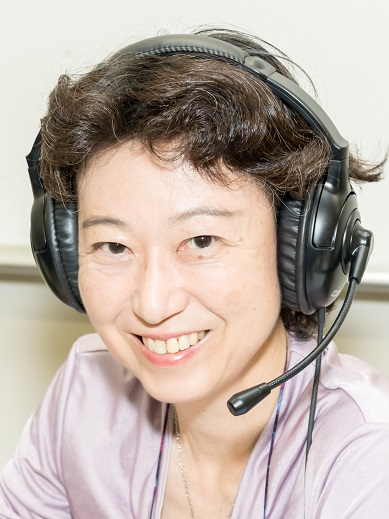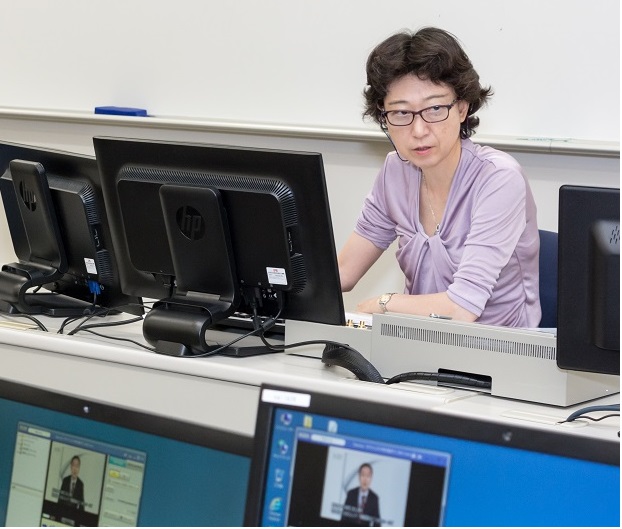

|
【講師プロフィール】
田村 智子(タムラ トモコ) 日米会話学院講師官庁企業委託科・同時通訳科講師、早稲田大学大学院国際コミュニケーション研究科(GSICCS)非常勤講師、
東京外国語大学大学院総合国際学研究科(GSGS)及びグローバル人材育成言語教育プログラム(GLIP)非常勤講師、亜細亜大学多文化コミュニケーション学科非常勤講師、会議通訳・司法通訳・通訳案内士
出身校/上智大学外国語学部英語学科 (BA in English Language)、ミシガン大学大学院言語学修士 (MA in Linguistics)、ハーバード大学大学院法律学修士 (ALM in Legal Studies)
国籍 / 日本
専門分野 / 英語教育、ビジネス会議・交渉英語の指導、通訳(同時通訳・ウィスパリング通訳・逐次通訳等)の訓練、通訳ガイドの指導、パブリックスピーキング及びディベートの訓練(日米会話学院官庁企業委託科ディベート主任講師)、英語圏の大学・大学院への留学準備の指導等
著作 /
◇『アメリカでホームステイする英語』南雲堂 1995年・1998年
◇『和英辞典を使わない英文ライティング』(週間ST 1996−97年間連載コラム)
◇『同時通訳が頭の中で一瞬でやっている英訳術リプロセシング』三修社 2010年
◇『同時通訳が頭の中で一瞬でやっている英訳術リプロセシングドリル』三修社 2011年
◇『Translating Business Talk』(Asahi Weekly 2011年4月−2012年3月隔週連載コラム)
◇『Who Is the Declarant of the English Translation of the Defendant’s Out-of-Court Foreign Language Statement? An “Authenticated Conduit” Theory』 (ハーバード大学大学院法律学修士論文、社会科学部門最優秀学位論文賞)
◇『通訳・翻訳自習ドリル』(通訳翻訳ジャーナル:イカロス出版 2016年−2017年
連載コラム) メッセージ /
There is no “magic” royal road to the mastery of English; much depends on your own sincere and dedicated effort. Still, a few learning hints here and there to improve the efficiency and effectiveness can be a big help. I hope that I can give you such help in class. Looking forward to meeting you or seeing you all again in class!
【学習内容】
This is an introductory-level course in “Japanese to English” interpreting work. Classes will be conducted in a workshop style, in which the participants will be called on individually to orally translate each given section from Japanese to English on the spot, followed by immediate feedback from the instructor. Materials will be chosen from among most up-to-date current issues. A major emphasis will be placed on: 1) analytical listening for and translation of the speaker’s “intended meaning,” not mechanical translation of verbatim vocabulary, 2) logical clarity in delivery, and 3) target-language accuracy (pronunciation, grammar, usage and collocation, etc.). The training menu is designed to: 1) help the students learn how to think in English when translating Japanese into English (so that the final product will be in more “natural” English, not direct or mechanical translation of each given Japanese expression; 2) learn how to translate without changing the original order of the information given in Japanese (so that later the skill can be transferred to simultaneous/whispering interpreting work); and 3) learn how to make quick priority decisions in communicating information in an inter-cultural environment. This class focuses on “Japanese to English” interpreting practice only.
*The class will be held in a CALL (Computer Assisted Language Learning) room, so the participants will be asked to bring a USB memory stick to every class session to download class materials and their own interpreting performances for review and further practice at home.
*You can obtain an account number and a password for using the CALL system on the first day in class.
*The content of this Tuesday class will be the same as that of the Thursday class.
【学習方法】
The participants will be called on to orally translate each given section of the Japanese talk into English, which is followed by immediate feedback from the instructor on various language and translation points. This class will be conducted in English, and all the explanations by the instructor will be given in English.
【学習形態】
This class will be conducted in an intensive workshop style, and the participants should be prepared to do “on-the-spot oral translation” in front of other classmates in every session.
【受講者に期待する達成レベル】
1. Become aware that translation is not just mechanical switching of words and phrases. 2. Learn to listen for the “meaning and logic” and communicate them in one’s own English without relying on a dictionary.